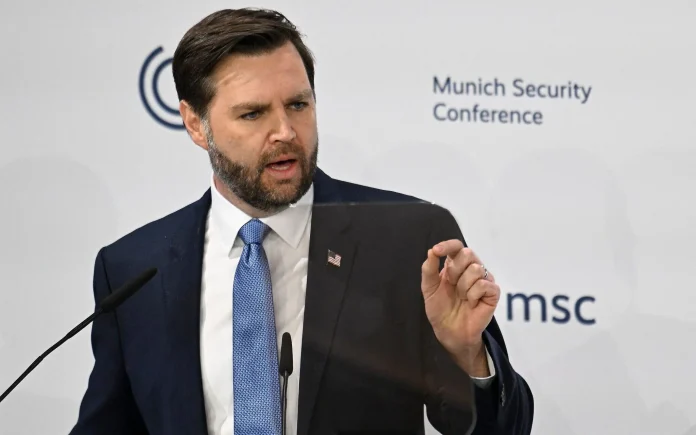On Friday, February 14, US Vice President JD Vance met Alice Weidel, the leader of Germany’s far-right party, the Alternative for Germany (AfD). Vance’s office confirmed the meeting after he endorsed the AfD as a potential political partner. Berlin rejected his stance, calling it unwelcome interference in Germany’s upcoming election.
Vance’s office did not provide many details about the meeting. However, they confirmed that he met with leaders of all Germany’s major political parties, according to the press pool.
Weidel confirmed the meeting as well. She said the two met for about 30 minutes at Vance’s hotel. They discussed the war in Ukraine, domestic German policy, and freedom of speech.
Role of AfD in German politics
The AfD, known for its anti-immigration views, is polling at around 20% ahead of Germany’s February 23 general election. Despite this, the party remains largely isolated. Other major German parties avoid cooperating with it due to its far-right stance, which is seen as taboo because of Germany’s Nazi past.
German parties follow a policy called the “firewall.” This policy prevents them from working with the AfD, which is also under surveillance by Germany’s domestic intelligence service.
Vance spoke out against this approach. He said, “Democracy is based on the sacred principle that the voice of the people matters. There’s no place for firewalls.” He also added, “No voter on this continent went to the ballot box to open the floodgates to millions of unvetted immigrants.” Vance made these remarks at the Munich Security Conference.
German leaders respond
Chancellor Olaf Scholz criticised Vance’s comments. In an interview with Deutschlandfunk radio, he called Vance’s remarks highly unusual. Scholz defended the firewall, stressing that it existed for good reason, given Germany’s history with National Socialism.
Defence Minister Boris Pistorius also criticised Vance. He called the US Vice President’s remarks unacceptable. Pistorius said, “This democracy was just questioned by the US Vice President, not just German democracy, but European democracy as a whole.” He argued that Vance seemed to compare Europe’s situation to that of authoritarian regimes, which he found unacceptable.
Foreign interference and political controversy
Friedrich Merz, leader of the Conservative party and a likely candidate to become Germany’s next Chancellor, faced accusations of breaking the firewall in January. Some claimed he sought AfD support for certain parliamentary motions. However, Merz has firmly ruled out working with the far-right party.
A German government spokesperson also responded to Vance’s involvement in the election. They said it was inappropriate for foreign figures to interfere in Germany’s election, especially during such an important period. The spokesperson added, “I don’t think it is right for foreigners, including those from friendly countries, to interfere so intensely in an election campaign.”
Billionaire Elon Musk, a major donor to Donald Trump’s election efforts, has also publicly supported the AfD.
